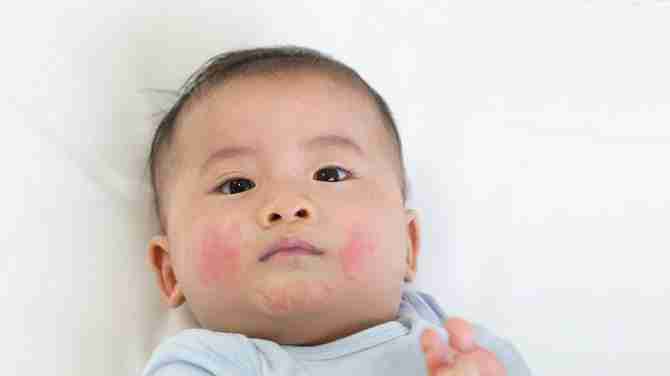
Introduction to Baby Skin Concerns
Baby acne or rash, with their soft, delicate skin, are not immune to the occasional spots and marks. As parents, it’s natural to worry when you see any imperfection on your baby’s perfect skin. However, most of these are normal and treatable. Today, we’re diving into the world of baby acne and rashes, aiming to clear up any confusion.
Understanding Baby Acne
Causes of Baby Acne
Believe it or not, baby acne is a common condition that affects many newborns. It’s thought to be caused by the transfer of hormones from the mother to the baby during the final stages of pregnancy, stimulating the baby’s oil glands.
Symptoms of Baby Acne
Baby acne typically presents as small red or white bumps on the cheeks, nose, and forehead. It can appear within the first few weeks after birth and usually clears up within a few months.
Identifying Baby Rashes
Common Types of Baby Rashes
Unlike baby acne, rashes can appear anywhere on the body and might be a sign of something more than just skin irritation. Examples include diaper rash, eczema, and heat rash.
Symptoms of Baby Rashes
Rashes can vary in appearance, from flat red patches to small raised bumps. They might also be dry, scaly, or even oozing. The key is noticing the spread and accompanying symptoms like fever or irritability.
Differentiating Between Baby Acne or Rash
Key Differences
The main differences lie in location and appearance. Baby acne is mostly on the face, while rashes can be widespread. Moreover, acne is generally limited to small bumps, whereas rashes might have a varied texture.
When to See a Doctor
It’s essential to consult a pediatrician if the acne or rash worsens or spreads or is accompanied by other symptoms, such as fever, which could indicate an infection.
Treatment and Care
Baby Acne Treatment
Patience is key, as most baby acne will clear up independently. However, gentle cleansing with water can help maintain skin hygiene.
Managing Baby Rashes
Treatment varies depending on the rash. Moisturizers can help with dryness, while a doctor might prescribe medication for more severe cases.
Preventive Measures
For Baby Acne
There’s no surefire way to prevent baby acne, but avoiding oily skincare products can help.
For Baby Rashes
Keeping the baby’s skin clean and dry is crucial, especially in the diaper area. Using hypoallergenic products can also reduce the risk of skin reactions.
Conclusion
Summary of Key Points
Understanding the differences between baby acne and rashes is vital for proper care and treatment. While baby acne is mostly a wait-and-see situation, rashes may require more attention and, sometimes, medical intervention.
Maintaining Healthy Baby Skin
Regular cleaning and careful observation keeping your baby’s skin healthy is regular. During bath time, use mild, fragrance-free soap during bath time irritation. Also, always change your diapers frequently to avoid diaper rash and gently pat the skin dry instead of rubbing.
Observing Your Baby’s Skin
It’s crucial to closely monitor any changes in your baby’s skin condition. While most baby skin issues are not serious, vigilant monitoring can help you catch potential problems early. Regular check-ups with your pediatrician are a good opportunity to address skin concerns.
Dressing Your Baby Right
Believe it or not, your baby’s clothes can affect their skin. Opt for soft, breathable fabrics like cotton to prevent irritation and overheating, which can exacerbate skin issues. Also, washing new clothes before the first wear can remove any irritants.
Sun Protection for Babies
Sun exposure can be harmful to your baby’s delicate skin. Keep your baby in the shade as much as possible, dress them in protective clothing, and apply a small amount of baby-friendly sunscreen to exposed areas if they are older than six months.
When to Seek Immediate Medical Attention
Certain signs warrant immediate medical attention, such as a rash that spreads quickly, blisters or pus-filled bumps, a fever accompanying a rash, or if your baby seems unusually lethargic or irritable. These could be signs of an infection or allergic reaction.
Empowering Parents
Remember, as a parent, you’re not expected to become an expert on skin conditions overnight. It’s okay to have questions and concerns about your baby’s skin health. Don’t hesitate to reach out to healthcare professionals with any questions. They can provide the guidance and reassurance you need.
Final Thoughts
Seeing anything unusual on your baby’s skin can be alarming, but most skin conditions are common and treatable. Always consult with a healthcare provider for peace of mind when in doubt.
FAQs
- Can baby acne appear on the body?
- Baby acne is primarily found on the face but can occasionally appear on the back or chest.
- How long does baby acne last?
- Baby acne usually clears up within a few months after it seems.
- Are there home remedies for baby rashes?
- Mild rashes often respond well to home care, such as keeping the skin clean and using moisturizers. However, consult a doctor before trying any new treatments.
- Can changing my baby’s diet help with rashes?
- If you’re breastfeeding and your baby has a rash, dietary changes on your part might help. For formula-fed babies, talk to your doctor about formula options.
- When should I worry about a baby rash?
- If a rash is accompanied by fever, seems to be causing discomfort, or spreads rapidly, it’s time to see a doctor.